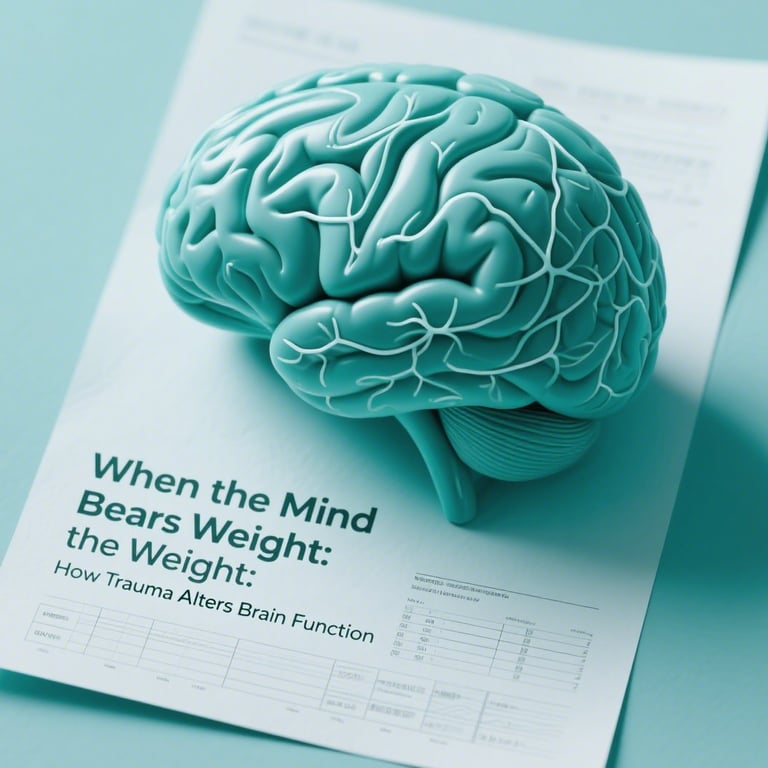When the Mind Bears the Weight: How Trauma Alters Brain Function
NEUROPSYCHOLOGYPSYCHOLOGYEDUCATION


Early-life trauma and adversity shape the brain in profound and enduring ways, influencing cognitive, emotional, and behavioural functions well into adulthood. The term Adverse Childhood Experiences (ACEs) includes a range of harmful experiences, including physical, emotional, and sexual abuse, neglect, household dysfunction, and exposure to violence. These experiences are not isolated incidents but rather foundational events that mold the brain’s architecture, affecting both mental and physical health outcomes over a lifetime.
Neuroscientific research emphasises that childhood is a period of remarkable plasticity, where the brain is particularly sensitive to environmental influences. While this plasticity allows for adaptation and growth, it also makes the developing brain vulnerable to the detrimental effects of chronic stress. When a child experiences prolonged or repeated trauma, their stress response system becomes dysregulated, leading to an overproduction of stress hormones such as cortisol and adrenaline. This biochemical upheaval does not merely alter mood or behavior at the moment, it fundamentally restructures key brain regions responsible for emotion regulation, memory, and decision-making. These alterations can make individuals more susceptible to psychiatric disorders, cognitive deficits, and even chronic physical health conditions later in life.
The severity of trauma’s impact is not uniform; it varies based on the nature of adversity, its duration, the child’s age when it occurs, and their resilience. Some individuals demonstrate remarkable recovery, whereas others struggle with lifelong emotional and cognitive difficulties, enhancing the complexity of trauma’s effects on the human brain.
Neurological Effects of Trauma
Understanding Trauma and Its Consequences
The Amygdala: The Center of Fear and Emotional Processing
The brain, designed for adaptability, can become maladaptive under persistent stress. Trauma-related changes are especially pronounced in three key brain regions: the amygdala, the hippocampus, and the prefrontal cortex. These structures work in concert to process emotions, regulate fear responses, and facilitate logical thinking, yet trauma can throw them out of balance.
Deep within the brain lies the amygdala, a small, almond-shaped cluster of neurons responsible for processing fear and detecting threats. When exposed to chronic trauma, the amygdala becomes hyperactive, akin to a security system stuck on high alert. This hyperactivity means that even minor stressors such as loud noises, unfamiliar faces, or unexpected changes can trigger an exaggerated fear response. Individuals with trauma histories often experience heightened anxiety, hypervigilance, and emotional outbursts because their amygdala remains on constant guard, interpreting everyday experiences as potential dangers.
Neuroimaging studies have repeatedly shown that individuals who have endured trauma exhibit increased amygdala activity in response to emotional stimuli. This heightened state of reactivity contributes to conditions like post-traumatic stress disorder (PTSD), where even seemingly neutral cues can evoke intense fear, intrusive thoughts, and flashbacks. Furthermore, the amygdala’s role in emotional memory consolidation means that traumatic events become deeply etched into an individual’s psyche, making it difficult to move past distressing experiences.
The Hippocampus: The Seat of Memory and Learning
Adjacent to the amygdala, the hippocampus governs memory formation, learning, and spatial navigation. Unlike the amygdala, which amplifies fear, the hippocampus plays a moderating role, helping to differentiate between real and perceived threats. However, when subjected to chronic stress, the hippocampus suffers damage. High levels of cortisol weaken hippocampal neurons, reducing their volume and impairing their ability to create and retrieve memories.
Individuals who have experienced early-life trauma often struggle with fragmented memories, difficulty recalling specific details, and an overall sense of cognitive fog. Studies consistently show that those with PTSD and depression exhibit reduced hippocampal volume, highlighting the lasting impact of trauma on memory and learning. A weakened hippocampus also contributes to impaired contextual processing, meaning that someone who has experienced trauma may struggle to recognize that a past danger is no longer a present threat. This can lead to persistent fear, even in objectively safe environments.
The Prefrontal Cortex: The Seat of Rational Thought and Regulation
The prefrontal cortex (PFC), located at the front of the brain, is responsible for executive functions such as decision-making, impulse control, emotional regulation, and problem-solving. Under normal conditions, the PFC helps regulate the amygdala, keeping emotional responses in check. However, chronic trauma disrupts this balance, leading to underdeveloped or impaired PFC function.
When the PFC is compromised, individuals struggle with self-regulation, impulse control, and emotional stability. This impairment can manifest as difficulty managing anger, engaging in risky behaviors, and struggling with long-term goal setting. Trauma survivors often find themselves caught in cycles of emotional reactivity and poor decision-making, as their ability to assess situations rationally is diminished. The weakened connection between the PFC and the amygdala further exacerbates emotional dysregulation, allowing fear responses to overpower logical thinking.
The Role of Cortisol and Chronic Stress
Cortisol, often called the "stress hormone," is essential for activating the body’s fight-or-flight response. While short-term cortisol release can help individuals respond to immediate threats, prolonged exposure to elevated cortisol levels can be neurotoxic, disrupting normal brain function and increasing vulnerability to mental health disorders.
The body’s stress-response system, known as the hypothalamic-pituitary-adrenal (HPA) axis, regulates cortisol production. However, in individuals exposed to chronic trauma, this system becomes dysregulated, leading to either excessive cortisol production or an inability to mount an adequate stress response. The consequences of prolonged cortisol exposure are wide-ranging, affecting cognitive, emotional, and physical health.
The hippocampus, which contains a high concentration of cortisol receptors, is particularly vulnerable to damage from excessive stress hormones. As a result, memory formation and learning suffer, making it difficult for trauma survivors to process new information or recall past experiences. Similarly, the PFC, responsible for higher-order thinking, is weakened, reducing an individual’s ability to plan, control impulses, and regulate emotions. Meanwhile, the amygdala grows increasingly reactive, amplifying fear responses and perpetuating cycles of anxiety and stress.
Beyond its effects on the brain, chronic stress also contributes to a range of physical health complications. Individuals with a history of trauma are at a heightened risk for conditions such as cardiovascular disease, metabolic disorders, immune dysfunction, and chronic pain. The mind-body connection is undeniable—when the brain is under prolonged distress, the body follows suit, leading to long-term health consequences.
The Brain’s Resilience and Pathways to Recovery
Despite the deep impact of trauma, the brain possesses an extraordinary capacity for healing through neuroplasticity. While trauma can leave lasting scars, targeted interventions can help reshape neural pathways and restore emotional balance. Psychotherapy, particularly Trauma-Focused Cognitive-Behavioral Therapy (TF-CBT) and Eye Movement Desensitization and Reprocessing (EMDR), has been shown to rewire maladaptive thought patterns and reduce distressing symptoms. Social support plays a crucial role in recovery, as strong relationships help buffer the effects of past adversity and promote emotional stability.
Lifestyle modifications, including regular exercise, a balanced diet, and sufficient sleep, can further support brain health and stress resilience. Mindfulness practices, such as meditation and deep breathing, help regulate the stress response and strengthen the brain’s ability to navigate emotional challenges. While the scars of trauma may never fully fade, understanding the profound impact of adversity on brain function empowers individuals to seek pathways to healing and resilience.
References:
Chanellé Hendrikse, Heuvel, L. L. van den, Robin Emsley, Seedat, S., & Stefan du Plessis. (2025). Increased Brain Age Among Psychiatrically Healthy Adults Exposed to Childhood Trauma—Hendrikse—2025—Brain and Behavior—Wiley Online Library. https://onlinelibrary.wiley.com/doi/10.1002/brb3.70450
Nakama, N., Usui, N., Doi, M., & Shimada, S. (2023). Early life stress impairs brain and mental development during childhood increasing the risk of developing psychiatric disorders. Progress in Neuro-Psychopharmacology and Biological Psychiatry, 126, 110783. https://doi.org/10.1016/j.pnpbp.2023.110783
News, N. (2025, March 19). Early-Life Adversity Reshapes Brain Development and Behavior. Neuroscience News. https://neurosciencenews.com/child-adversity-brain-behavior-28494/
Orellana, S. C., Richard A. I. Bethlehem, & Simpson-Kent, I. L. (2024). Childhood maltreatment influences adult brain structure through its effects on immune, metabolic, and psychosocial factors | PNAS. https://www.pnas.org/doi/full/10.1073/pnas.2304704121
Tomoda, A., Nishitani, S., Takiguchi, S., Fujisawa, T. X., Sugiyama, T., & Teicher, M. H. (2024). The neurobiological effects of childhood maltreatment on brain structure, function, and attachment. European Archives of Psychiatry and Clinical Neuroscience. https://doi.org/10.1007/s00406-024-01779-y
UCL. (2023, October 30). New study reveals impact of childhood trauma on brain structure. Brain Sciences. https://www.ucl.ac.uk/brain-sciences/news/2023/oct/new-study-reveals-impact-childhood-trauma-brain-structure
